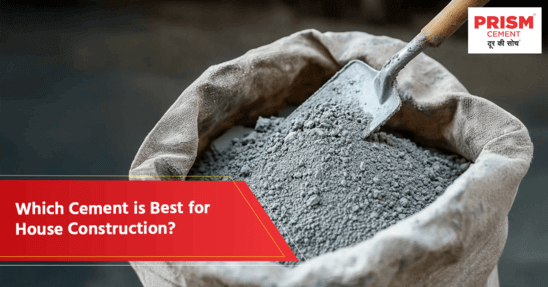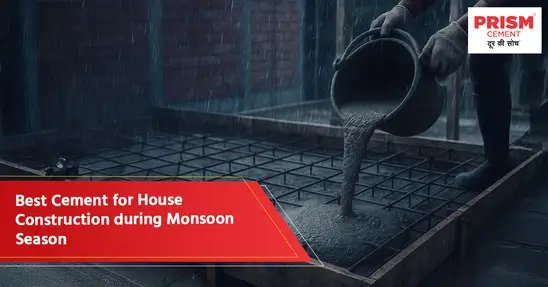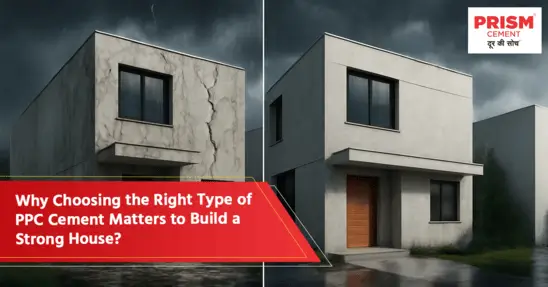Building your dream home is an exciting journey, but it comes with critical decisions, one of the most important being the choice of cement. Cement forms the backbone of any structure, ensuring durability, strength and longevity. Choosing the best cement for house construction can significantly impact not only the quality of your home but also the overall house construction cost.
Here’s everything you need to know about selecting the right construction cement for your needs.
Which Cement Brand is Best for House Construction?
Cement, an essential material in construction, has a fascinating history. It dates back to the Roman Empire when volcanic ash and lime were used to bind stones. Modern cement, developed in the early 19th century, revolutionized construction. But with so many options today, which cement brand is best for house construction? The answer lies in understanding the type of cement, its composition and how it aligns with your project requirements.
Composition of Cement
Cement consists of several key components, each with a specific function in enhancing the structural integrity of your home:
- Limestone (Calcium Oxide): The primary ingredient that gives cement its strength and durability. It reacts with other materials in the mix to form the hard, solid mass we associate with concrete.
- Silica (Silicon Dioxide): Contributes to the cement's hardness and enhances its ability to withstand wear and tear over time. It is one of the most abundant elements in nature and plays a crucial role in the cement's long-term performance.
- Alumina (Aluminum Oxide): This component helps the cement to resist chemical attacks from elements such as water, acids and other corrosive substances. It is vital for cement that will be used in harsh environments.
- Iron Oxide: While it mainly contributes to the color of cement, iron oxide also plays a role in enhancing the cement's strength and stability.
- Gypsum: This substance is added to control the setting time of the cement. Without gypsum, the cement would set too quickly, making it difficult to work with.
By understanding the role of these components, you can better appreciate the differences in cement for construction and how it affect your project.
Types of Cement and Their Uses
There are several types of cement, each tailored to specific applications. Here’s an overview:
- Ordinary Portland Cement (OPC): Standard, general-purpose cement with quick setting and high strength
- Portland Pozzolana Cement (PPC): Durable, chemical-resistant, eco-friendly cement with pozzolanic materials
- Rapid Hardening Cement: Quick-setting cement for fast-paced projects
- Sulfate-Resistant Cement: Resists damage from sulfate-rich environment
- White Cement: Aesthetic cement used for decorative finishes and architectural work
For most residential projects, PPC cement is recommended as the best cement for house construction due to its numerous advantages.
Advantages of Using PPC Cement for House Construction
Portland Pozzolana Cement has gained immense popularity for residential projects because of its benefits:
- Durability: PPC cement offers excellent durability, particularly in coastal and humid areas.
- Resistance to Chemicals: It resists sulfate attacks and prevents cracks in the structure.
- Cost-Effectiveness: Its long-term durability reduces maintenance costs.
- Eco-Friendly: The manufacturing process of PPC uses industrial by-products like fly ash, reducing carbon emissions and promoting sustainability.
When factoring in long-term performance and costs with a raw material calculator for house construction, PPC emerges as a top choice.
Sustainability and Environmental Impact
Cement production is often criticized for its environmental impact. Traditional manufacturing processes emit significant carbon dioxide. However, innovations in construction cement are helping mitigate these effects.
- Blended Cement (PPC): Incorporates industrial by-products to reduce the environmental footprint.
- Energy-Efficient Processes: New technologies help minimise energy consumption in cement production.
- Recycling and Reuse: Use of demolition waste in cement manufacturing is a growing trend.
Choosing sustainable options not only aligns with global environmental goals but also ensures eco-friendly construction for your home.
Latest Trends in Cement for Construction
The construction industry is witnessing rapid advancements in cement technologies. Here are some trends to watch:
- Smart Cements: Self-healing materials that can repair cracks automatically, improving the lifespan of structures
- Low-Carbon Cements: Innovations aimed at reducing CO₂ emissions during cement production, making it more environmentally friendly
- Enhanced Durability Cements: Cements designed to withstand extreme conditions, offering long-lasting performance
- Digital Integration: Tools like construction cost calculators are increasingly factoring in sustainable and advanced cement options for more efficient project planning.
These trends ensure that the best cement for house construction will combine durability, efficiency, and sustainability.
Expert Tips for Choosing Cement
Here are some practical construction tips to help you make the right choice:
- Understand Your Requirements: Determine the specific needs of your project durability, setting time and resistance to environmental factors.
- Check Certifications: Always opt for cement brands that meet BIS (Bureau of Indian Standards) specifications.
- Assess Quality: Conduct basic quality checks, like verifying the manufacturing date and ensuring no lumps are present.
- Use Technology: Utilize tools, such as raw material calculator for house construction to plan and estimate material requirements.
- Consult Experts: A professional's advice can guide you toward the best cement for house construction based on your location and project.
Conclusion
Selecting the right cement for construction is crucial for the longevity and strength of your home. With advancements in technology and a focus on sustainability, homeowners now have access to a variety of options tailored to their needs. PPC cement, with its balance of durability and eco-friendliness, remains a preferred choice for residential projects. By leveraging tools like a house construction cost calculator and following expert tips for construction, you can ensure a strong foundation for your dream home.
Remember, the question isn't just which cement brand is best for house construction, but which type of cement aligns with your specific requirements. Make an informed choice and invest in quality for a home that stands the test of time!
Prism Cement offers a range of high-performance cement products to suit various construction needs. Known for its rapid strength gain, Prism Champion All Weather Cement is ideal for projects requiring quick completion, such as plastering. It also offers excellent workability and water resistance. Check out Prism Cement’s full range of products here.




